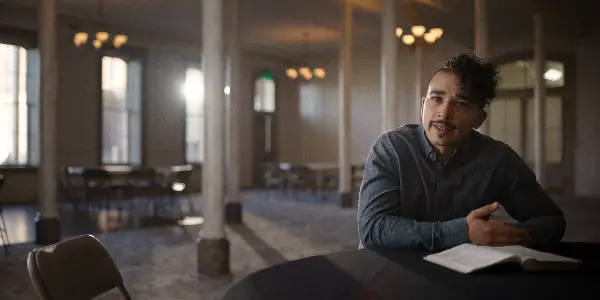“There’s a fine line between faith and madness.” This is really the dramatic question at the heart of National Geographic‘s new documentary, The Mission, which chronicles the story of John Chau, a young man who looked to take the Christian message to the remote Sentinelese people and was killed soon after.
It’s a measured, thought-provoking, and complex story with so many elements for filmmakers Amanda McBaine and Jesse Moss to parse through. And they fill out their exploration with voices highlighting different aspects of the narrative while we are left to contend with all the pieces. What’s more, the confluence of animation, sound design, and movie clips, alongside the interviews, feels like something surprisingly cinematic.
I can only open this review by being very candid. I was drawn to The Mission because I come from a faith background; I know friends who have a heart for sharing the Christian message with the unfamiliar. I can understand how this can simultaneously be seen in two ways: It’s either something noble or riddled with the cultural complexities of colonialism and moral ambiguity when it comes to infringements on man-made laws.
Even as I’ve had to reconsider in the last 5 years or so what it means to be a person of faith in America and grapple with terms like evangelical, used more often as a political bloc than a way of life, I feel like I’ve also had to appraise my thoughts about missions. This story features detractors, including John’s father, who believed his son had been co-opted by this mission-minded community.
Then there’s the more anthropological perspective; the Sentilese have lived alone for this long because they want to and furthermore, any outside human interaction could potentially devastate them with unwanted disease. National Geographic, to their credit, also points the microscope at their own history because through their images they too have helped implicitly propagate a certain kind of exoticizing otherness in a westerncentric world.
The Story’s Arc
The documentary takes ample time to highlight John’s wanderlust and his love of the outdoors, charting his youth with images from Robinson Crusoe, My Side of the Mountain, and The Adventures of Tintin. I knew them all fondly when I was growing up too.
It’s easy to write him off as someone with a want of adventure out of story books and perhaps inculcated with an overblown savior complex. It would be so easy to push this arc, and there are markers for it. The Mission, however, does give the faith community the respect of having a couple of John’s friends represented along with a pastor who knew him.
These particular voices overlap with ones I might have known, and they color the contours of this young man; they make him more complex, sincere, and far more difficult to dismiss. Co-workers and friends from all walks of life vouch for how welcoming he was. It’s also easy to see his charisma and his concern for other people.
In the Christian Bible, there is a letter where one of the early leaders named Paul tells his friends in the ancient city of Corinth that although the world might perceive him to be “out of his mind,” he is genuine and looking to serve God and other people. This feels strikingly similar to Chau’s perception. However, Paul as well as his contemporary Peter also point out that Christians should subject themselves to human authorities and institutions — in Roman days that included paying taxes to Caesar.

This might seem like a digression, but for anyone in the faith community, it’s what makes The Mission such a perplexing watch. Historical flaws and institutional sins notwithstanding, I assume most individual Christians want to help other people and make the world better. So how do we reconcile these two entities? The dialogue comes by not forcing an agenda so much as giving us all these disparate points of view. And it’s a conversation for everyone.
Conclusion: The Mission
I kept on wondering what would John think of everything — all of this being made of his life and his diaries — and what part do we as an audience have to play? Is it only morbid curiosity or is there something more here? But there’s one last subtle thing I just couldn’t shake.
John Chau‘s father is Chinese-American, and his mother is white, so he grew up as a mixed kid like me. I kept on thinking, as I watched him up on the screen living a life that overlapped with mine in very broad terms, how did I not end up like John? What makes us different? Am I just less “crazy” or less committed? Maybe only God knows.
What I’m left with are the words of John’s buddy Levi. He says, “My friend did something stupid and courageous and bold, and I wish I was that bold.” You can make of The Mission what you will, but I think we would all do well to sit in conversation with one another because there is so much here to unpack in the middle of this tension. It’s undeniable.
The Mission was initially released on October 13, 2023, in the U.S.
Does content like this matter to you?
Become a Member and support film journalism. Unlock access to all of Film Inquiry`s great articles. Join a community of like-minded readers who are passionate about cinema - get access to our private members Network, give back to independent filmmakers, and more.